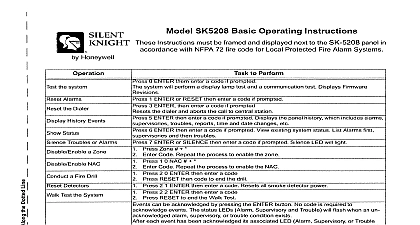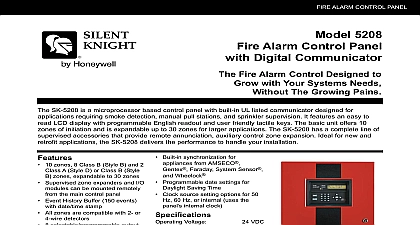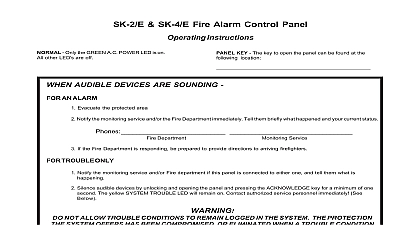Silent Knight SK-5208 Conventional FACP 10-30 Zone Manual

File Preview
Click below to download for free
Click below to download for free
File Data
| Name | silent-knight-sk-5208-conventional-facp-10-30-zone-manual-7462309158.pdf |
|---|---|
| Type | |
| Size | 2.71 MB |
| Downloads |
Text Preview
Model Control Communicator and Manual 151204 Rev P 151204 P ECN 17 0298 Procedure to the following will aid in problem free installation with long term reliability Precautions Adherence to the following will aid in problem free installation with long term reliability Several different sources of power can be connected to the fire alarm control panel Disconnect all sources power before servicing Control unit and associated equipment may be damaged by removing and or inserting cards or interconnecting cables while the unit is energized Do not attempt to install service or operate this unit until are read and understood CAUTION System Re acceptance Test after Software Changes To ensure proper operation this product must be tested in accordance with NFPA 72 after any programming operation or change in software Re acceptance testing is required after any change addition or deletion of system components or any modification repair or adjustment to system hardware or wiring All components circuits system operations or functions known to be affected by a change must be 100 tested In addition to ensure that other operations are inadvertently affected at least 10 of initiating devices that are not directly affected by the change up to a maximum 50 devices must also be tested and proper system operation verified This system meets NFPA requirements for within the range of 0 32 or humidity within the range of 10 93 at 30 86 non However the useful life of the system standby batteries and the electronic components may be adversely by extreme temperature ranges and humidity Therefore it is recommended that this system and its peripherals be in an environment with a normal room temperature of 15 27 C 60 80 F Verify that wire sizes are adequate for initiating and indicating device loops Most devices cannot tolerate more than a 10 I R drop from the specified device Like all solid state electronic devices this system may operate erratically or can be damaged when subjected to induced transients Although no system is completely immune from lightning transients and interference proper will reduce susceptibility Overhead or outside aerial wiring is not recommended due to an increased to nearby lightning strikes Consult with the Technical Services Department if any problems are anticipated encountered Disconnect AC power and batteries prior to removing or inserting circuit boards Failure to do so can circuits Remove all electronic assemblies prior to any drilling filing reaming or punching of the enclosure possible make all cable entries from the sides or rear Before making modifications verify that they will not with battery transformer or printed circuit board location Do not tighten screw terminals more than 9 in lbs may damage threads resulting in reduced terminal contact pressure and difficulty with screw terminal fire alarm control panels contain static sensitive components Always ground yourself with a proper wrist strap handling any circuits so that static charges are removed from the body Use static suppressive packaging to protect assemblies removed from the unit the instructions in the installation operating and programming manuals These instructions must be followed to damage to the control panel and associated equipment Fire Alarm Control Panel FACP operation and reliability upon proper installation installing a fire alarm system may make lower insurance rates possible it is not a substitute for fire insurance An fire alarm system typically made up of smoke detectors heat detectors manual pull stations audible warning and a fire alarm control with remote notification capability can provide early warning of a developing fire Such system however does not assure protection against property damage or loss of life resulting from a fire Any fire alarm may fail for a variety of reasons Smoke detectors may not sense fire where smoke cannot reach the detectors such in chimneys in walls or roofs or on the other side of closed doors Smoke detectors also may not sense a fire on level or floor of a building A second floor detector for example may not sense a first floor or basement fire all types of smoke detectors including ionization and photoelectric types have sensing limitations No type smoke detector can sense every kind of fire caused by carelessness and safety hazards like smoking in bed violent escaping gas improper storage of flammable materials overloaded electrical circuits children playing with or arson Smoke detectors must be installed in the same room as the control panel and in rooms used by the for the connection of alarm transmission wiring communications signaling and or power If detectors are not so a developing fire may damage the alarm system crippling its ability to report a fire Audible warning devices as bells may not alert people if these devices are located on the other side of closed or partly open doors or are located another floor of a building A fire alarm system will not operate without any electrical power If AC power fails the will operate from standby batteries only for a specified time Rate of Rise heat detectors may be subject to sensitivity over time For this reason the rate of rise feature of each detector should be tested at least once per by a qualified fire protection specialist Equipment used in the system may not be technically compatible with the It is essential to use only equipment listed for service with your control panel Telephone lines needed to transmit signals from a premise to a central monitoring station may be out of service or temporarily disabled The most cause of fire alarm malfunctions however is inadequate maintenance All devices and system wiring should be and maintained by professional fire alarm installers following written procedures supplied with each device System and testing should be scheduled monthly or as required by national and or local fire codes Adequate written of all inspections should be kept 1 1 1 Model SK 5208 Features 1 1 This Manual 1 1 to Contact Silent Knight 1 1 Optional Accessories 1 2 2 Listings and Requirements 2 1 Communications Commission FCC 2 1 Laboratories UL 2 1 Requirements for All Installations 2 2 Requirements for Central Station Fire Alarm Systems 2 2 Requirements for Auxiliary Protected Fire Alarm Systems for Fire Alarm Service 2 2 Requirements for Remote Station Protected Fire Alarm Systems for Digital Communication or Reversal 2 2 3 Panel Installation 3 1 Specifications 3 1 Specifications 3 1 Wiring Specifications 3 1 Board Components 3 3 Mounting the SK 5208 3 4 Preventing Water Damage 3 4 Draw Calculations


